
There was a time when CES' annual takeover of Las Vegas was about as reliable as the passing of seasons, but the COVID-19 pandemic has transformed this year's event into the first all-digital show of the trade convention's decades-long history. In lieu of crowded conference halls, on-stage keynotes and late-night parties, attendees are logging on to watch consumer technology's major names discuss upcoming trends in virtual fireside chats and Brady Bunch-esque roundtables.
Amidst all of this, companies big and small are again pulling back the curtains from their newest health and wellness technologies, with offerings ranging from remote sensors to smartphone apps to a non-invasive glucose monitor. Read on below for MobiHealthNews' list of CES 2021's product announcements (and check back throughout the week as the reveals keep rolling in).
 Epsy Health, maker of a free epilepsy management app, picked up two CES Innovation Awards at this year's show: the “Best of Innovation Award” for the Health and Wellness category, and an “Innovation Award” in the Software and Mobile Apps category.
Epsy Health, maker of a free epilepsy management app, picked up two CES Innovation Awards at this year's show: the “Best of Innovation Award” for the Health and Wellness category, and an “Innovation Award” in the Software and Mobile Apps category.
Launched in July, the iOS and Android smartphone app helps users track their seizures and other components of their condition. It includes a library of educational information, medication reminders, a rescue medication function and a feature that lets users print out a PDF report of their personal trends for use in the doctor's office. The digital tool also works with users' Apple Watches, and their Apple Health or Google Fit apps.

Omron Healthcare, the maker of a range of medical devices for professional and consumer use, is taking its first stab at remote patient monitoring.
Called VitalSight, the product is a clinician-provided home kit that includes a connected blood pressure monitor and a data hub. The technology can be integrated into an EHR system, allowing doctors to view patients' data within their records or through a data analysis and automatic notification dashboard built by the company. The company said it will be partnering with Mount Sinai New York and Northwestern Medicine for early rollout of the system.
"OMRON created VitalSight specifically for hypertension management," Jeffrey Ray, Omron's executive director of business and technology, said in a statement. "This new service is designed to encourage more remote monitoring, more communication between the patient and the physician, and more data to make treatment decisions and improve health outcomes."
Omron also took advantage of the virtual show to preview the 2.0 update of its Omron Connect mobile app. A combination of its existing HeartAdvisor and Omron Connect apps, the tool will communicate with the company's various connected blood pressure monitors while feeding users new health insights based on their readings.
 Biometric sensor maker Valencell unveiled a version of its cuffless, calibration-free blood pressure measurement tech that can be embedded into devices worn on the finger and wrist. Previously available only for devices worn in the ear, this tech now allows partner companies to add the feature to their smartwatches, pulse oximeter finger clips and other similar devices.
Biometric sensor maker Valencell unveiled a version of its cuffless, calibration-free blood pressure measurement tech that can be embedded into devices worn on the finger and wrist. Previously available only for devices worn in the ear, this tech now allows partner companies to add the feature to their smartwatches, pulse oximeter finger clips and other similar devices.
To do so, the company's software combines data from photoplethysmography (PPG) and inertial sensors rather than a traditional cuff. According to Valencell, this approach can generate readings throughout the day with similar accuracy to blood pressure cuffs.
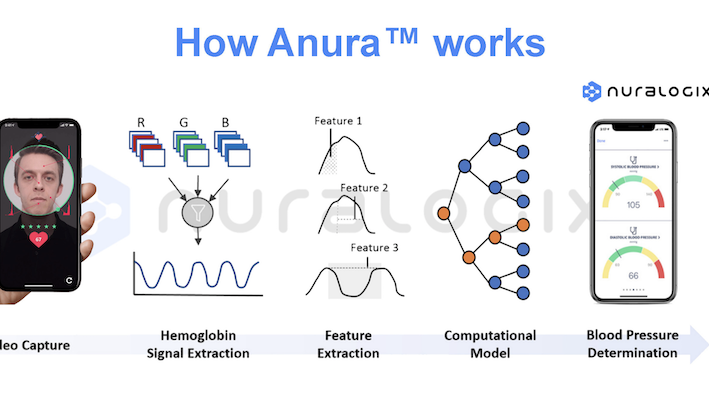
Meanwhile, Toronto-based NuraLogix came to the show with its own take on blood pressure monitoring: a smartphone app that takes readings within 30 seconds and without physical contact. The Anura app shines a light through the skin and measuring its translucency to understand blood flow. The company is offering the app as a free iOS and Android download for personal use, and offerings SDKs and white-labeled integrations for enterprises. It is available in seven languages.
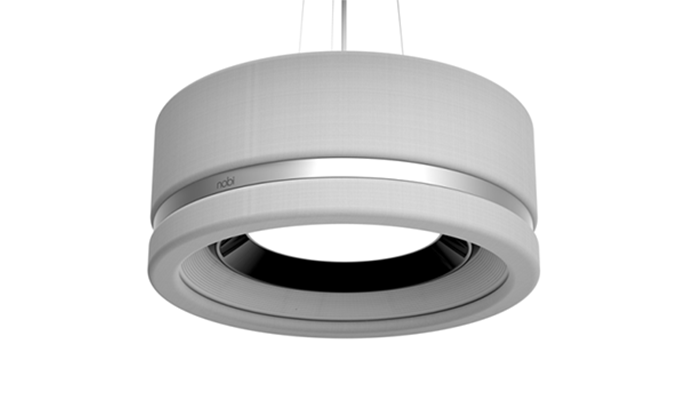 Belgian startup Nobi introduced a hanging smart lamp designed for seniors living alone in their homes. The device uses AI to detect falls in its proximity, asks the resident if they are alright and calls family members or emergency services if necessary. The lamp also includes an array of secondary smart features such as fire and burglary detection, air quality monitoring and photo sharing.
Belgian startup Nobi introduced a hanging smart lamp designed for seniors living alone in their homes. The device uses AI to detect falls in its proximity, asks the resident if they are alright and calls family members or emergency services if necessary. The lamp also includes an array of secondary smart features such as fire and burglary detection, air quality monitoring and photo sharing.
 Fluo Labs is looking to sidestep allergy medications with Flō, a handheld device for managing allergic rhinitis (or hay fever). When placed in the nose and activated, the company says the product projects lights to trigger reactions in the body which limit uncomfortable allergy symptoms. The company said it is seeking over-the-counter approval from the FDA, and expects the device to be available to consumers later this year.
Fluo Labs is looking to sidestep allergy medications with Flō, a handheld device for managing allergic rhinitis (or hay fever). When placed in the nose and activated, the company says the product projects lights to trigger reactions in the body which limit uncomfortable allergy symptoms. The company said it is seeking over-the-counter approval from the FDA, and expects the device to be available to consumers later this year.
 HD Medical revealed a remote patient monitoring device that includes a smart stethoscope, seven-lead ECG Bluetooth connectivity and other tools to measure and transmit an individual's basic vitals. Called HealthyU, the product offering is paired with an app and cloud platform. While the stethoscope component was cleared by the FDA last year, the company said that its aiming to receive an Emergency Use Authorization to allow for home use in the U.S. Until then, the platform is open for clinical research, corporate wellness and telehealth pilots.
HD Medical revealed a remote patient monitoring device that includes a smart stethoscope, seven-lead ECG Bluetooth connectivity and other tools to measure and transmit an individual's basic vitals. Called HealthyU, the product offering is paired with an app and cloud platform. While the stethoscope component was cleared by the FDA last year, the company said that its aiming to receive an Emergency Use Authorization to allow for home use in the U.S. Until then, the platform is open for clinical research, corporate wellness and telehealth pilots.
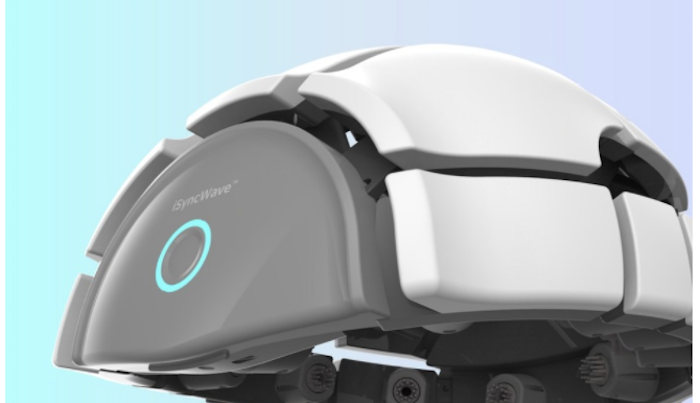
iMediSync is showing off its iSyncWave, a gel-free, portable EEG brain mapping device and LED-therapeutic device. Worn over the head, the device is designed to support early detection of neuropsychiatric disorders, as well as to provide treatment either in a clinic or remotely at home. The device also works with theiSyncMe mobile app and iSyncBrain supporting cloud platform, which the company outlines as a potential path to telemedicine and virtual care deployments.
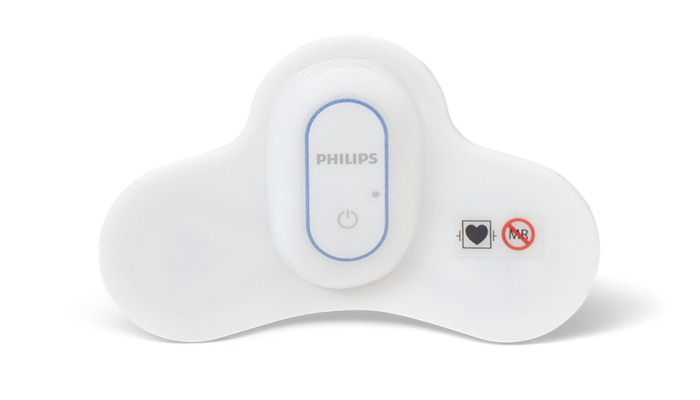
Philips came to CES with a slew of health and wellness tech products in tow.
The healthcare side of that spectrum includes the Philips Patient Monitoring Kit, a ready-to-deploy kit for ICUs that supports critical care teams quickly ramping up their unit's care capacity during emergencies, and the Philips BX100 Wearable Biosensor, a remote vital signs measurement device that's placed on the chest to measure respiratory rate, heart rate, posture, active level and ambulation.
In addition the company is showing off a 3D facial scanning tool that streamlines CPAP mask selection, a new app-connected version of its Sonicare toothbrush and a teledentistry solution for offices looking to take their practice virtual.
Japanese health tech startup Quantum Operation brought what it's calling "the world's first glucose measuring wrist that enables truly nonstop monitoring" – AKA, the kind of non-invasive continuous glucose monitor that's long stood as something of a holy grail for the diabetes management tech space. According to the company, the sensor's "spectrum sensing technology" is able to measure blood glucose through the skin while being worn at the wrist.
![]()
South Korea-based ICON.AI announced a product that combines a smart display with a detachable sensor able to take six different health readings.
The first component of the "Smart Healthcare Device" is a connected LCD touchscreen with built-in speakers and AI personal assistant features through Amazon Alexa. The other half is a small device that takes heart rate, blood pressure peripheral oxygen saturation and other health readings from two fingertips in roughly 60 seconds. According to the company, the system can alert a third party such as a hospital or family member when severe results are detected.
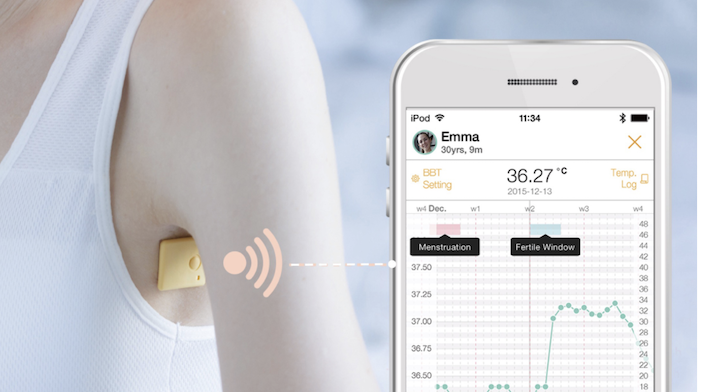
Taiwan's iWEECARE is showing off a wearable smart patch for body temperature measurement called the Temp Pal that it says is ideal for use either in the hospital or with infants. The lightweight product can transmit its readings wireless for remote monitoring, and according to the company measures within an accuracy of .05 degrees Celsius. It works with a mobile app that updates in real time, pushes alerts for abnormal temperatures and also can be used to document the user's medication history.
 PressureDOT, another Taiwanese company, is showing off its eponymous wireless sensor. The device is either swallowed or inserted into the body via nasogastric tube delivery, where it continuously measures and transmits intra-abdominal pressure, temperature and its own 3D location in real time, according to the company. The signal is received by "a special antenna array," and can be monitored by doctors during treatment using their mobile device.
PressureDOT, another Taiwanese company, is showing off its eponymous wireless sensor. The device is either swallowed or inserted into the body via nasogastric tube delivery, where it continuously measures and transmits intra-abdominal pressure, temperature and its own 3D location in real time, according to the company. The signal is received by "a special antenna array," and can be monitored by doctors during treatment using their mobile device.
 Consumer wearables brand Amazfit wheeled out its GTR 2e and GTS 2e smartwatches for the digital show.
Consumer wearables brand Amazfit wheeled out its GTR 2e and GTS 2e smartwatches for the digital show.
Among design features such as a rotatable AMOLED screen, the watches provide 24-hour heart rate monitoring via a PPG optical sensor, blood-oxygen saturation measurements during activity, sleep quality monitoring, stress measurement and an algorithm-driven health assessment tool that translates all of the watch's readings into a single numbered score. The watches connected to the company's Zepp app, which wearers can use to get a comprehensive read on the information their smartwatches are collecting.
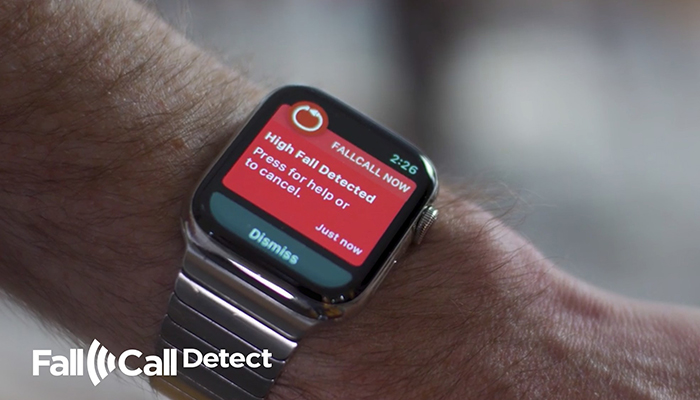 FallCall Solutions announced that it is rolling out its new tech that can detect if a person falls with a connected personal emergency response system (PERS). Dubbed FallCall Detect, the tool was designed to be able to tell if a fall was high-impact. If this kind of fall is detected, the system can automatically connect to emergency services. When a lower-impact fall happens, the tech can connect to community links.
FallCall Solutions announced that it is rolling out its new tech that can detect if a person falls with a connected personal emergency response system (PERS). Dubbed FallCall Detect, the tool was designed to be able to tell if a fall was high-impact. If this kind of fall is detected, the system can automatically connect to emergency services. When a lower-impact fall happens, the tech can connect to community links.
The tech is first going to go live on the Apple Watch app.
"Several older adults I've treated for falls owned a medical alert device but didn't use it. They said it was too bulky, stigmatizing or inconvenient, and they've experienced embarrassing false alarms," FallCall Solutions cofounder Dr. Shea Gregg said in a statement. "By offering simple, safe and smart technology, combined with PERS capabilities on an Apple Watch they already wear, we believe we will have much greater adoption, daily usage and earlier treatment of fall injuries."
 Sosche Industries, best known for its car products, released a new heart rate monitor dubbed the Rhythm+2.0. The tool was designed to be worn as an armband and contains optical sensors that can continuously measure blood flow and body movement.
Sosche Industries, best known for its car products, released a new heart rate monitor dubbed the Rhythm+2.0. The tool was designed to be worn as an armband and contains optical sensors that can continuously measure blood flow and body movement.
The waterproof sensor was built on Valencell’s PerformTek biometric sensor. The system is able to pair with smartphones, watches and fitness equipment.
 The ainenne sleep trainer is a smart bedside lamp designed to help parents put their infants to sleep. According to its Japanese developer First Ascent, the device collects a child's crying pattern and sleeping trend to inform and adjust an array of sleep-minded features, from white noise generation to wake up time recommendations to gentle illumination upon awakening. The device is also linked to a smartphone app, which parents can use to review the collected data.
The ainenne sleep trainer is a smart bedside lamp designed to help parents put their infants to sleep. According to its Japanese developer First Ascent, the device collects a child's crying pattern and sleeping trend to inform and adjust an array of sleep-minded features, from white noise generation to wake up time recommendations to gentle illumination upon awakening. The device is also linked to a smartphone app, which parents can use to review the collected data.
Startup CarePLUS.ai is highlighting a senior care monitoring system that consists of a 360-degree camera mounted to a room's ceiling, speakers, AI and a user app. The system monitors routine activities to gain an understanding of their behaviors, according to the startup, and within 10 days provides active assistance in the form of meal ordering or accident prevention.
The U.K.-based startup Medic-lead ltd announced its AI-enabled handwashing console is available for preorder. The Handsteco washing console automatically dispenses hand soap while displaying the World Health Organization’s hand hygiene techniques. The device tracks hand movements to ensure the techniques are being followed, and will not turn on the faucet until the user has completed the action as displayed. The company will begin manufacturing the AI wash basin in 2021, according to the release.
Ergomotion, a maker of adjustable bed bases, announced plans to integrate more connected technologies into its products to further improve users’ health and wellness. The company is looking to expand beyond features like temperature controls and wired remotes into a world of whole-home connectivity. Areas of interest include aromatherapy integration, health data tracking and customized circulation cycles while asleep.














